DUMAGUETE, PHILIPPINES - Travel Guide
- Andre
- Dec 2, 2019
- 7 min read
Updated: Sep 3, 2020
DUMAGUETE TRAVEL GUIDE
Dumaguete is the capital city of the Negros Oriental province and is often called “The City of Gentle People”. Dumaguete has a beautiful coastline, scenic waterfalls, active volcanoes(!) and plenty of hiking trails with interesting wildlife. Not to mention the incredible scuba diving and free-diving opportunities along the coast.
One of the first things you will notice in Dumaguete is the abundance of youth around the city. Dumaguete prides itself with 4 universities as well as a handful of colleges, making Dumaguete’s student population more than a quarter of its total residents! This contributes to the city having loads of entertainment and food variety to please the diverse collection of people that come from all over to study here. Of course, from Dumaguete, you can also easily visit the nearby islands of Cebu and Siquijor.
RELATED POSTS:
TRAVEL TIPS FOR DUMAGUETE
The easiest way to get to Dumaguete is by air with Cebu Pacific and Philippines airlines offering daily flights to/from Manila. Cebu Pacific also has flights to Cebu, Davao and Cagayan de Oro.
To travel overland from Cebu to Dumaguete you can take a bus from Cebu South Bus Terminal to Lilo-an in the south of Cebu and take a 20 min ferry ride to Sibulan. It is also possible to get on a bus at Cebu South Bus Terminal and go all the way to the bus terminal in Dumaguete - the bus uses the 'RORO' ferry between Bato and Tempi.
We recommend using BookAway or 12Go website to view boat schedules and book a ticket in advance online.
The easiest and most common option for getting around Dumaguete is by using a tricycle; which is ubiquitous in the city. Try to avoid the peak hours if possible as traffic can get surprising thick for such a small city! In theory, the rates are fixed based on distance but in practice, locals just pay a simplified rate of PHP10 to PHP20 per person per trip. As Dumaguete is less than 4 kilometres from end to end, it's legally speaking (in theory that is) impossible for tricycle fares to exceed PHP20 for intra-city travel. However, if you look remotely foreign, it's an almost certainty the driver will quote a much higher rate - or they'll ask how much you want to pay (which is an obvious tip-off of to overcharging). Definitely do not succumb to this blatant form of discrimination and rather take a photo of the driver's tricycle (with number visible) and report it to the authorities. Tricycles from the airport should cost PHP100 per person and to the airport expect to pay PHP150.
Have a look at Skyscanner.com or Kiwi.com for some great flight deals.
DUMAGUETE SIGHTS AND HIGHLIGHTS
RIZAL BOULEVARD
Running along the seaside from Dumaguete Port, Rizal Boulevard is a great place for a stroll, any time of the day. On one side you have ocean views and on the other side, you have shady trees, park benches, the usual hawkers and no shortage of food stalls. At night, the Boulevard is illuminated, food stalls come out, and plastic chairs and tables allow you to relax while taking in the atmosphere.
CHINESE BELL CHURCH
Just along the coast, south of Rizal Boulevard, you will find the Chinese Bell Church, a traditional Taoist Temple.
AQUINO FREEDOM PARK
One of the best places to get authentic Filipino food nice and cheap is along Aquino Freedom Park. At the front of the park, you will find the Neoclassical Negros Capital Building. The park itself is a great place to sit and chill either on the grass or a park bench and people watch. The busy streets are lined with permanent Filipino food stalls, where you can try some chicken adobo, tapa cured beef, longganisa Philippine sausage, or Lumpia.
SILLIMAN UNIVERSITY CAMPUS
Silliman University is not only the biggest campus in Dumaguete, it is also one of the top 8 universities in the Philippines and one of the top 300 Universities in Asia. The campus was founded in 1901 by Dr. David Sutherland Hibbard, a missionary. The university buildings are beautiful and it even has its own church and chapels.
BELFRY TOWER
This ancient watchtower’s role was to secure the city and protect it from pirates who used to raid the port. Once it was built in 1760, the watchtower began to serve as Dumaguete’s defence. Today you can visit the brick tower and climb up the weathered stairs to get a view over the port. There is a small grotto of Our Lady of Perpetual Help at the bottom of the tower where you can light a candle and say a prayer. If you wait for sunset, the tower will light up adding to the area’s atmosphere.
DUMAGUETE CATHEDRAL
The oldest stone church on Negros Island, St. Catherine of Alexandria Cathedral was originally built from 1754 to 1776, reconstructed in 1885 and extended in 1936.
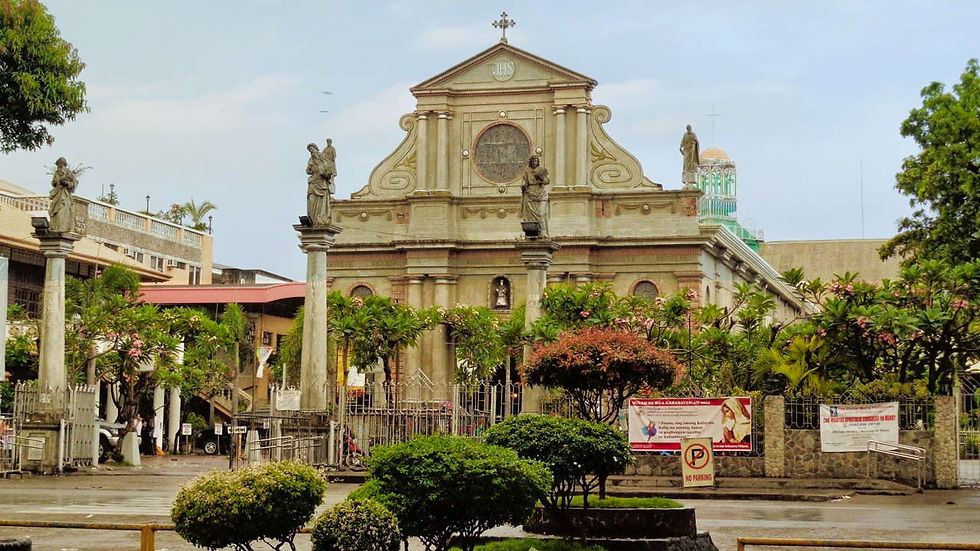
QUEZON PARK
While you visit the Dumaguete Cathedral and Belfry Tower, also take a few minutes to stroll through Quezon Park or maybe spend some time relaxing here watching people go about their daily activities.
MT. KANLAON
Standing at 2 430m high, Mount Kanlaon is impossible to miss. Located within the Mount Kanlaon Natural Park, you can dare the 3-day hike up this active volcano with promising views, wildlife spotting and even hot springs. Take note, however, that Mt. Kanlaon is within the Pacific Ring of Fire and has erupted a total off 28 times, with 9 eruptions since 2001 and the most recent eruption in 2016. If you are planning this hike you will need to head over to the DENR office in Bacolod to apply for a hiking permit beforehand (and to sign your life away!).
MOUNT TALINIS
Perhaps a better alternative for the more sensible of us, Mount Talinis is the second tallest mountain in the region, right behind Mt. Kanlaon, standing at 1 903m high. Mt. Kanlaon is known as “Cuernos de Negros” or “The Horn of the Negros” and is only a potentially active volcano.
MAKAWIWILI RIDGE
Also known as the “Saddle in the Sky”, the Mt. Makawiwili Ridge can be found between two mountain peaks. A great place to hike and enjoy the magnificent scenery.
BALINSASAYAO TWIN LAKES NATURAL PARK
Here you can view two scenic volcanic lakes, take a short hike in the peaceful nature or a boat ride to the other side of the lake. Just note that you are not allowed to fly drones here and the entrance fee is rather steep.
PULANGBATO FALLS
The Pulangbato Falls are easily identified by their rusty red colour. The waterfall plummets down with noisily and then mellows out to create a calm pool in which you can swim. The waterfall is part of a resort and your entrance fee includes access to areas to relax and enjoy the day.
CASARORO FALLS
You’ll need to fit to enjoy the journey to reach this waterfall, but if you are, the views will be very rewarding. After the scenic drive through the mountains, you’ll need to walk up a rocky hill, make your way across a hanging bridge, climb down 355 stairs and climb over a rocky riverbed in order to make it to the bottom of the falls! Once you’ve done that, you really deserve the refreshing swim that awaits.
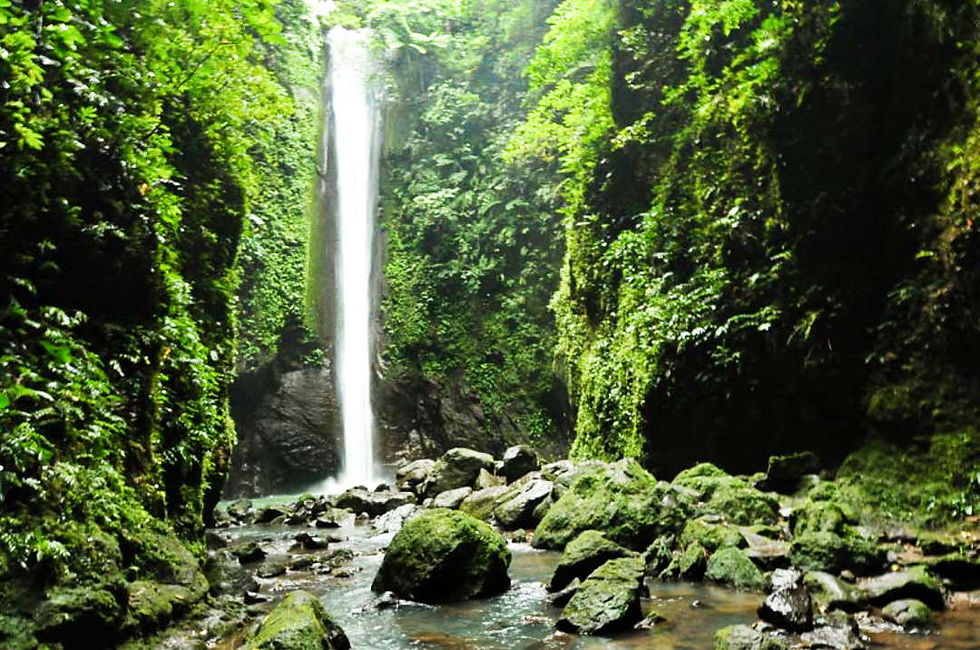
MALATAPAY LIVESTOCK MARKET
Open 7 days a week, Malatapay is a local outdoor market, which although not aimed at tourists, can be very interesting to tourists. There is everything from fresh produce, local foods and even live animals auctions.
Sights a little further from Dumaguete...
DOLPHIN WATCHING IN TANON STRAIT
Not the cheapest of tourist activities, but this can be rather special. It takes about an hour to reach Tanon Strait from Dumaguete. If you want the best chance of seeing the dolphins in action, you’ll have to be willing to get up and going really early. The trip starts with a boat ride along Bais Bay to Tanon Strait which is home to bottlenose, long-snouted spinner, and pantropical spotted dolphins. It is also home to melon-headed whales, pygmy sperm whales, pygmy killer whales and many more. After visiting the strait, tours usually head to Manjuyod White Sandbar for some lunch, swimming, snorkelling and other water activities.
BULWANG CAVES
If you’re looking for a full day of exploring caves, then take the day trip out to explore the three Bulwang Caves of Panligawan Cave, Pandalihan Cave, and Crystal Cave. These caves are extremely diverse, comprised of dark underground tunnels, space-ship sized open grottos that let in shining beams of light, and icicle formations covering the ceiling everywhere you look. They are relatively close-by to each other so they make for the perfect day tour. You’ll need to wear active shoes as there are plenty of steps to climb and rocks to clamber over.
TALABONG MANGROVE PARK & BIRD SANCTUARY
This is a fun day trip for nature enthusiasts to take from Dumaguete. You can walk around discovering different species of mangroves while bird-watching or you can simply relax with the echoing sounds of wildlife around you.
WHERE TO FIND LOCAL FOOD IN DUMAGUETE
There is no shortage of local street-side food available in Dumaguete. As a student town, there is an abundance and variety of cheap food available. Three of the best areas to head to are:
1 - Rizal Boulevard is well known for the tempura stalls and is best at night when food stalls come out with their and plastic chairs and tables.
2 - Perdices Street where you will find an abundance of local carinderias (local canteens or eateries).
3 - Freedom Park and the adjacent roads are lined with permanent Filipino food stalls.
DUMAGUETE FOOD SPECIALITIES
SILVANAS
Silvanas are frozen cookies made from buttercream and cashew-meringue wafers and also covered with cookie crumbs. The creaminess melts in your mouth and they are a heavenly sweet treat.
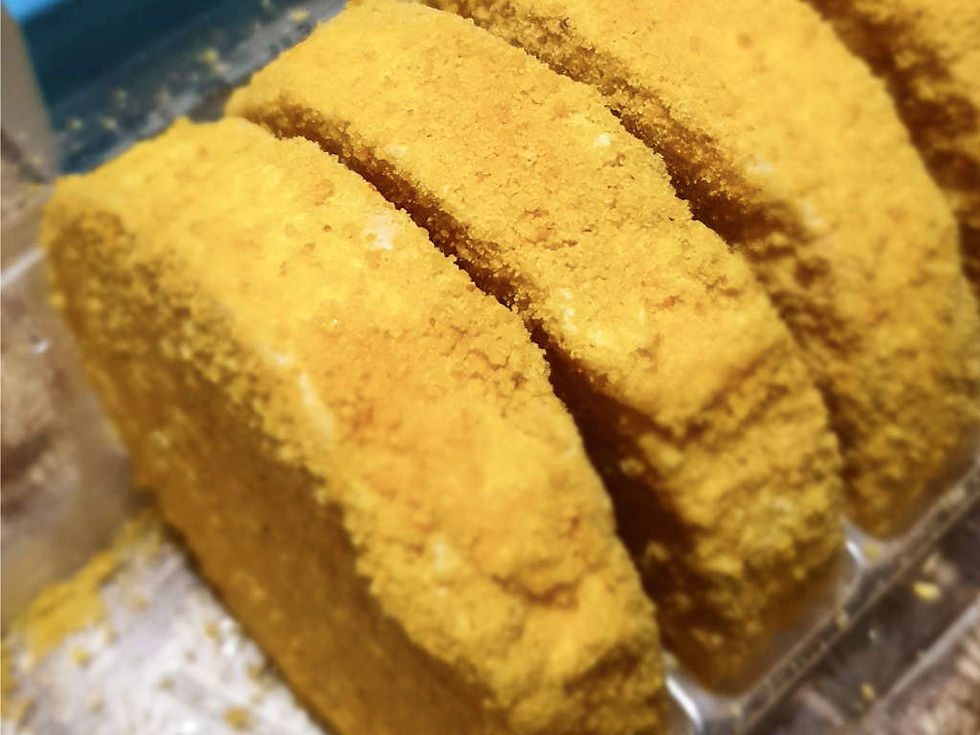
SANS RIVAL
Sans Rival is a cake made from the same ingredients as Silvanas and is just as delicious.
CASSAVA CAKE
This dense cake is made from grated cassava, coconut milk, eggs and butter, It is baked and then topped with a layer of custard, coconut cream and condensed milk.
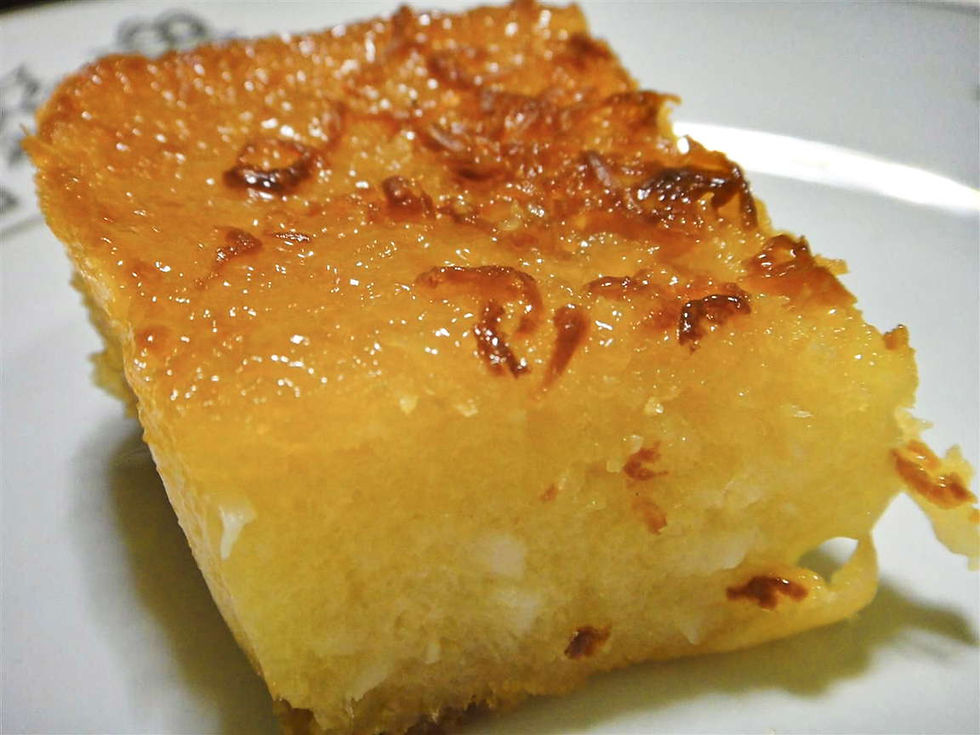
BIKO
This glutinous rice pudding is first partially cooked by steaming and then cooked further in coconut milk and brown sugar before being topped with latik (coconut cream boiled until it turns solid and brown in colour).
TEMPURA
One of the bestselling street foods in the city, you will find plenty to choose from all along the popular Rizal Boulevard. Filipino tempura is a deep-fried fish cake (very similar to Kikiam) which you dip in various spicy sauces. You can also try this local delicacy from one of the many Bossing Tempura shops, where their sauces are numbered from 1 (sweet) to 5 (fiery hot).
BUDBUD / BODBOD KABOG
Budbud or Bodbod Kabog is Negors Oriental’s version of Suman. Where Suman is traditionally a glutinous rice cake wrapped in banana leaf, Budbud / Bodbod Kabog is made from millet seeds. Traditionally, Budbud is served with a delicious cup of hot chocolate and is the star at every Negrense’s breakfast table.
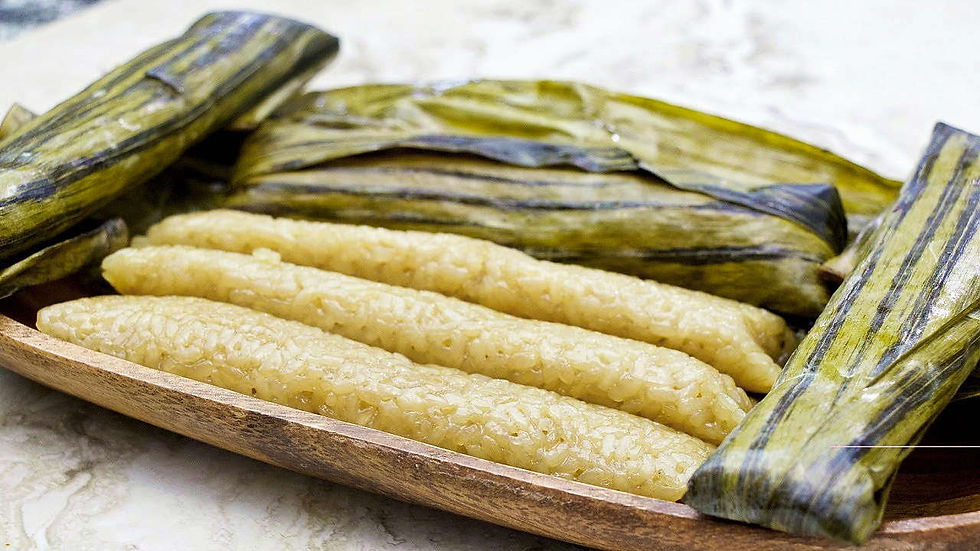
KWEK-KWEK
Deep-Fried Battered Quail Eggs, you can find these from many a mobile food vendor.
LUMPIA
Also called Lumpia Shanghai, these deep-fried spring rolls are filled with a mixture of ground pork, carrots and onions. We think that Lumpia are the perfect snack for any time of the day!






